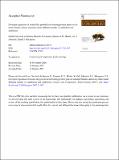Divergent regulation of insulin-like growth factor binding protein genes in cultured Atlantic salmon myotubes under different models of catabolism and anabolism
Abstract
Much attention has been given to insulin-like growth factor (Igf) pathways that regulate the balance of skeletal muscle protein synthesis and breakdown in response to a range of extrinsic and intrinsic signals. However, we have a less complete understanding of how the same signals modulate muscle mass upstream of such signalling, through a family of functionally-diverse Igf-binding proteins (Igfbps) that modify the availability of Igfs to the cell receptor Igf1r. We exposed cultured myotubes from Atlantic salmon (Salmo salar L.) to treatments recapturing three catabolic signals: inflammation (interleukin-1β), stress (dexamethasone) and fasting (amino acid deprivation), plus one anabolic signal: recovery of muscle mass post-fasting (supplementation of fasted myotubes with Igf-I and amino acids). The intended phenotype of treatments was confirmed by significant changes in myotube diameter and immunofluorescent staining of structural proteins. We quantified the mRNA-level regulation of the full expressed Igf and Igfbp gene complement across a post-treatment time course, along with marker genes for muscle structural protein synthesis, as well as muscle breakdown, via the ubiquitin-proteasome and autophagy systems. Our results highlight complex, non-overlapping responses of Igfbp family members to the different treatments, suggesting that the profile of expressed Igfbps is differentially regulated by distinct signals promoting similar muscle remodelling phenotypes. We also demonstrate divergent regulation of salmonid-specific gene duplicates of igfbp5b1 and igfbp5b2 under distinct catabolic and anabolic conditions. Overall, this study increases our understanding of the regulation of Igfbp genes in response to signals that promote remodelling of skeletal muscle.
Citation
Garcia de la Serrana , D , Jofre , E N , Martin , S A M , Johnston , I A & Macqueen , D J 2017 , ' Divergent regulation of insulin-like growth factor binding protein genes in cultured Atlantic salmon myotubes under different models of catabolism and anabolism ' , General and Comparative Endocrinology , vol. 247 , pp. 53-65 . https://doi.org/10.1016/j.ygcen.2017.01.017
Publication
General and Comparative Endocrinology
Status
Peer reviewed
ISSN
0016-6480Type
Journal article
Description
This work received funding from the MASTS pooling initiative (The Marine Alliance for Science and Technology for Scotland) and their support is gratefully acknowledged. MASTS is funded by the Scottish Funding Council (grant reference HR09011) and contributing institutions.Collections
Items in the St Andrews Research Repository are protected by copyright, with all rights reserved, unless otherwise indicated.

